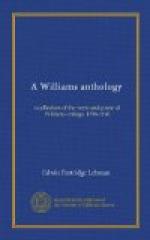So presently I went up and served my lord and my lady where they sat at a little table alight with many tapers, like the shrine in the great church at Soissons, with the goblets and the silver dishes making a brave show among them. There was a strange air over it all, like the breathless moment in a tourney when the tucket has blown and the knights pause before giving spur. My lady, when she spoke at all, spoke in a voice as of some one stifling, but my lord said never a word and ate and drank but little, his eyes always on my lady’s face. Bye-and-bye up came two little meat pasties, borne by the fat cook himself, who charged me with a certain one for my lady and another for my lord. I thought nothing whatever on this, for often there was special pasty made for my lady without hare’s meat, which she disliked. So I served the pasties, and I remember the faint sweetness of her garments, like wind from apple-blossoms, and how yellow was her hair and how clear her face in the light of the many tapers. That course, too, they ate in silence, but before I could take away the dishes, my lord broke the stillness.
“Lady,” quoth he, “is the flavor of this pasty pleasing to thy palate?”
“Ay, sir,” spake my lady, “it hath a piquant savor I have not met before.”
“Lady,” said he, “it is fashioned of passing good meat and rare, so rare that I doubt thou wilt ever enjoy its like again. For far countries have contributed to its making, with spices from Araby and Cathay, and corn from Egypt, and citron from Spain, and from the Terre Sainte there is, minced into very little pieces, the heart of that noble sieur Renaud, the worshipful Chatelain of Coucy. His esquire I haply intercepted with a dagger on his way to thy chamber with his dead lord’s heart in a silver casket as a gift for thee.”




